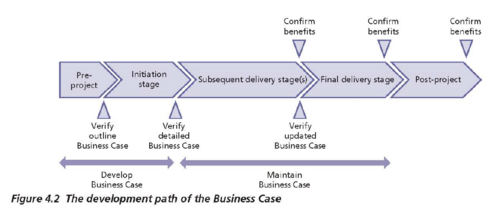Business Case
This article treats the subject Business Case within project management. The definitions of Business Case are discussed with its limitations. Business Case is the document that defines whether or not a project is worth undertaking from the company perspective. A Business Case can be either pre-defined from a corporate level or initiated at project start. The Business Case is revisited and refined throughout the project duration. Within the initial phase of a project the Business Case is being defined and developed, but once the project progresses past the initiation stage, the Business Case is being maintained through the rest of the project. The Business Case is evaluated through a cost-benefit analysis, such as a payback period or Net Present Value(NPV) which is more comprehensive compared to the payback period analysis. The article will discuss relevant tools to Business Case and the relevant responsibilities when creating or working with a Business Case.
The Business case is defined by Murray,(2009)[2] as a document that presents the optimum mix of information used to judge whether a project is desirable, viable and achievable, and therefore worthwhile investing in. A similar definition for a Business Case is made by Maylor (2010) [3] ‘. . . justification for undertaking a project, in terms of evaluating the benefits, cost and risk of alternative options and rationale for the preferred solution. Its purpose is to obtain management commitment and approval for investment in the project. The business case is owned by the sponsor.’
Contents |
What is a Business Case
A Business Case is the reference point before, during, and after. A Business Case is a document that contains the justification for a Business to undertake a project as well as the value this project creates when completed. The Business Case needs to contain crucial information about the project such as:
• Reasons
• Options
• Benefits and dis-benefits
• Timescale
• Cost
• Major Risks
• Opportunities [4]
Types of Business Cases
A Business Case can take many forms. The following are several examples:
• ROI (Return On Investment): Spending time and money in development is expected to deliver far more money than went into the project.
• Strategic: The project supports the Organization's Strategy and/or Mission (which may not always be about short-term, or dollar-for-dollar returns).
• Investment: Developing new products in the laboratory, for eventual (“we hope”) expansion into money-making products.
• Values: This is a variation on Strategy/Mission—where the organization's social values are agreed, as part of the corporate culture, to be one of the organization's common expectations and goals.
• Research: “We'll probably lose money on this project, but we will learn a lot that will help us set the organization's future direction.”
• Efficiency: A variant of ROI, the project is done to improve the organization's operational processes.
• Compliance (Regulatory/Statutory/Fiduciary): A project is required for the organization to comply with external regulations. [4]
Defining a Business Case
Executive Summary
Reasons
Business Options
Expected Benefits
Expected Drawbacks
Timescale

Cost
Investment Appraisal
Major Risks
Responsibilities
Sponsor Role
Relevant Tools
Evaluating and analysing a Business Case is important to understand and determine whether or not to undertake the project.
Payback Period
Net Present Value (NPV)
Limitations
References
- ↑ https://youtu.be/bDAsAbMMep0, Procurement Academy 2015, Business Case - Definitions
- ↑ Murray, Andy & Co. (2009), Managing successful projects with PRINCE2, 5th edition, p. 21, United Kingdom, TSO.
- ↑ Maylor, H. (2010). Project Management, Pearson Education ltd, 4th edition, p.184, GB, ISBN: 9780273704324
- ↑ 4.0 4.1 Herman, B. & Siegelaub, J. M. (2009). Is this really worth the effort? The need for a business case. Paper presented at PMI® Global Congress 2009—North America, Orlando, FL. Newtown Square, PA: Project Management Institute.
- ↑ Murray, Andy & Co. (2009), Managing successful projects with PRINCE2, 5th edition, p. 23, United Kingdom, TSO.
References Credibility
In general, using web sources a critical mindset must be used when citing these. The video referenced was made by Procurement Academy. This is a company who deal with competencies training of staff and creates their own content for the training.
Annotated Bibliography
Further Reading
Further reading about the template for making a Business case: http://www.projectmanagementdocs.com/project-initiation-templates/business-case.html#axzz4XoPzbU80
Murray, Andy & Co. (2009), Managing successful projects with PRINCE2, 5th edition, p. 21-28, United Kingdom, TSO.
Annotation: The book has a seven-page chapter about Business Case, and describes in details how to develop it.
Maylor, H. (2010). Project Management, Pearson Education ltd, 4th edition, p.184-191, GB, ISBN: 9780273704324
Annotation: The development of a Business Case is explaned in seven pages with different examples and descriptions.
Herman, B. & Siegelaub, J. M. (2009). Is this really worth the effort? The need for a business case. Paper presented at PMI® Global Congress 2009—North America, Orlando, FL. Newtown Square, PA: Project Management Institute.
Annotation: Article published by the Project Management Institute in 2009, explaining the essentials of a Business Case and its importance.
H. Pearson, "Project Management", Chapter 10 Pearson Education Limited, 4th. Edition (2010)
Annotation: This chapter is about Risk & Opportunities Management and describes: risk matrix, Rumsfeld's Known-unknowns, qualitative and quantitative approaches, sensitivity analysis, PERT technique and Monte Carlo simulation.